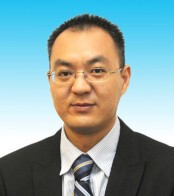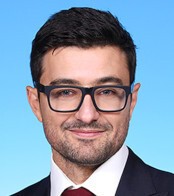Shijun Zhao, PhD, City University of Hong Kong, Hong Kong, China
Dr. Zhao received his Bachelor’s degree in Physics and his Ph.D. degree in Nuclear Engineering, both from Peking University. After graduation, Dr. Zhao conducted his postdoctoral research at the College of Engineering at Peking University. Prior to joining the City University of Hong Kong, he was a postdoctoral research associate at Oak Ridge National Laboratory.
Dr. Zhao’s current research focuses on chemically disordered materials (high-entropy materials) through a combination of computational materials science and machine learning techniques. Specifically, his group aims to understand surface effects, defect thermodynamics, and defect evolution in chemically disordered materials under deformation or irradiation conditions. For this purpose, different simulation techniques at different scales are concurrently or sequentially employed.
Penghui Cao, PhD, University of California, Irvine, USA
 Dr. Penghui Cao is an Assistant Professor in the Department of Mechanical and Aerospace Engineering at University of California, Irvine, USA. Prior to this, he was a postdoctoral associate at Massachusetts Institute of Technology after obtaining his doctorate from Boston University in 2014. His research involves developing microscopic modeling algorithms to probe the mechanisms controlling microscale deformation and failure of materials. His research interests lie in the fundamental understanding of rate-dependent plastic deformation and flow in the context of computational materials modeling, with applications to advanced materials technology.
Dr. Penghui Cao is an Assistant Professor in the Department of Mechanical and Aerospace Engineering at University of California, Irvine, USA. Prior to this, he was a postdoctoral associate at Massachusetts Institute of Technology after obtaining his doctorate from Boston University in 2014. His research involves developing microscopic modeling algorithms to probe the mechanisms controlling microscale deformation and failure of materials. His research interests lie in the fundamental understanding of rate-dependent plastic deformation and flow in the context of computational materials modeling, with applications to advanced materials technology.
Fritz Körmann, PhD, Max-Planck-Institut für Eisenforschung, Germany
 Dr. Fritz Körmann is the leader of the group “Complex Concentrated Alloys” at the Department of Computational Materials Design of Max-Planck-Institut für Eisenforschung. His research focuses on the four topics: 1. Many-body theories, Greens functions, Density functional theory, Theory of magnetism; 2. First-principles calculations of ground-state and finite-temperature properties, phase stabilities, local and extended defects (e.g., stacking fault energies); 3. Magnetism, (Quantum) Monte Carlo methods, Heisenberg models, Magnons, Magnon-phonon interactions, magnetic entropies; 4. Steels, high entropy alloys and materials for magnetic applications.
Dr. Fritz Körmann is the leader of the group “Complex Concentrated Alloys” at the Department of Computational Materials Design of Max-Planck-Institut für Eisenforschung. His research focuses on the four topics: 1. Many-body theories, Greens functions, Density functional theory, Theory of magnetism; 2. First-principles calculations of ground-state and finite-temperature properties, phase stabilities, local and extended defects (e.g., stacking fault energies); 3. Magnetism, (Quantum) Monte Carlo methods, Heisenberg models, Magnons, Magnon-phonon interactions, magnetic entropies; 4. Steels, high entropy alloys and materials for magnetic applications.
Francesco Ciucci, PhD, University of Bayreuth, Germany
 Prof. Francesco Ciucci is a University Professor at the University of Bayreuth, Germany, holding the Chair of Electrode Design for Electrochemical Energy Systems. Before his current role, he was associated with the Hong Kong University of Science and Technology in various capacities. Francesco is an alumnus of Politecnico di Milano and Ecole Centrale de Paris. He completed his Ph.D. at the California Institute of Technology (Caltech) as a Rotary Ambassadorial Scholar and Bechtel Fellow and did his postdoctoral work at the Heidelberg Graduate School of Mathematical and Computational Methods for the Sciences of the University of Heidelberg, Germany. There, he obtained a Marie Curie Fellowship and a Heidelberg Graduate School Fellowship. His research articles have been featured in major journals, including Nature Catalysis, Nature Chemistry, Joule, Energy & Environmental Science, among others. Francesco’s current research centers around solid-state energy materials, including those used in fuel cells and solid-state batteries, with particular emphasis on modeling such systems and developing new functional materials. Lastly, He is a Fellow of the Royal Society of Chemistry.
Prof. Francesco Ciucci is a University Professor at the University of Bayreuth, Germany, holding the Chair of Electrode Design for Electrochemical Energy Systems. Before his current role, he was associated with the Hong Kong University of Science and Technology in various capacities. Francesco is an alumnus of Politecnico di Milano and Ecole Centrale de Paris. He completed his Ph.D. at the California Institute of Technology (Caltech) as a Rotary Ambassadorial Scholar and Bechtel Fellow and did his postdoctoral work at the Heidelberg Graduate School of Mathematical and Computational Methods for the Sciences of the University of Heidelberg, Germany. There, he obtained a Marie Curie Fellowship and a Heidelberg Graduate School Fellowship. His research articles have been featured in major journals, including Nature Catalysis, Nature Chemistry, Joule, Energy & Environmental Science, among others. Francesco’s current research centers around solid-state energy materials, including those used in fuel cells and solid-state batteries, with particular emphasis on modeling such systems and developing new functional materials. Lastly, He is a Fellow of the Royal Society of Chemistry.

